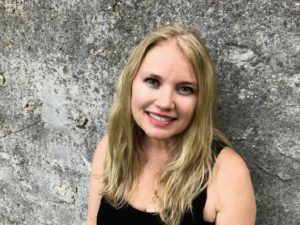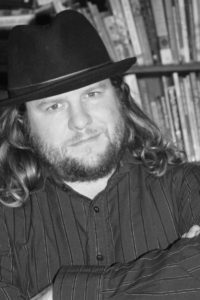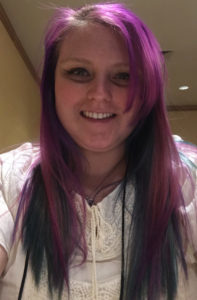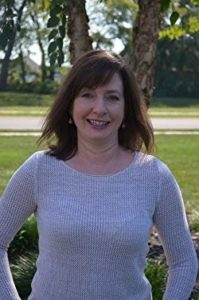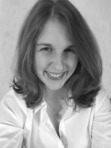Jessica A. Scott's Blog, page 3
October 19, 2017
Introducing New English Language Courses: Everything You Need to Know About Irregular English Verbs
Hello everyone!
From my own personal experience, I can tell you that most English authors are also lovers of the English language. They are interested, not just in what words mean, but how they sound, how they came to be, and how to use them in the most effective way. I have studied English for most of my life, and I have recently decided to take what I have learned and share it with other people. In addition to my novel writing, I am now an online English instructor, whose goal is to help ESL and EFL students get a firmer grasp of the English language so that they can communicate better for job, school, or other purposes. My goal is to make learning the language fun and interesting, and to give students hope in spite of the challenges that come with learning a tough language like English.
With that in mind, I created my first online English course, Everything You Need to Know About Irregular English Verbs. You can check it out on Udemy.com via the links below, and even use the coupon code to get 55% off! I plan to make more courses in the future, but for now, you can check out all of the details about this one below, or on my Courses page. If you decide to take the course, I hope you’ll let me know what you thought of it, and I hope that it helps you in your journey to master the English language!
Here are the course details:

Everything You Need to Know About Irregular English Verbs – Udemy.com
Course Preview on YouTube
Learn how to recognize, categorize, and conjugate some of the most difficult irregular verbs in the English language.
Master one of the most frustrating aspects of the English language with these tips and tricks to help you memorize irregular verbs faster and more efficiently.
Find out the difference between a “regular” verb and an “irregular” one
Notice patterns in irregular verbs that make them easier to learn
Discover how using context clues can help you to identify the tense of a verb
Learn the conjugations for even some of the most complex irregular verbs
Build a solid foundation for mastering irregular verbs by learning how to conjugate 30+ of the most used and most challenging English verbs
One of the most important aspects of the English language, simplified
Irregular verbs are the bane of every language learner’s existence. Just when you think you have English verbs down pat, a verb like “be” comes along with its confusing and complicated conjugation chart, and makes you feel like you don’t know anything! I am, you are, they were… how are you supposed to keep track of them all?
With this course, you will discover several tips and tricks that make learning irregular verbs much simpler. This takes the frustration out of the learning process, which will make it easier for you to expand your vocabulary. The skills taught in this course are essential for ESL/EFL learners, English students, and anyone looking to get a job in an English-speaking country.
Content and Overview
Designed with English as a Second Language (ESL) and English as a Foreign Language (EFL) students in mind, this course is meant to make one of the most complicated aspects of the English language simple and easy to understand. While native English speakers learn irregular verbs by interacting with other native English speakers when they are children, ESL and EFL learners don’t have this same advantage.
Most teachers and professors say that memorization is the only way to learn irregular verbs, but that is not all there is to it. While memorization is important, there are many ways to make recognizing and remembering these irregular verbs much easier.
With these lessons, you will learn, not just the basics about what makes an irregular verb irregular, but also how to recognize these verbs when you see them. Perhaps more importantly, though, you will learn that while most irregular verb conjugations seem random, there are patterns and similarities between these verbs. Knowing this allows you to group verbs together and learn them in batches, which takes the challenge out of mastering one of the most frustrating parts of the English language.
In this course, we will take a look at four main types of irregular verbs. We begin with the top ten most common irregular verbs, which are used on a daily basis by all native English speakers. Once you have mastered those, we will cover two of the most prevalent irregular verb patterns in the English language, and we will wrap things up by learning how to conjugate some of the most difficult, seemingly random irregular verbs in existence.
When you have completed all of the sections in the course, you will have gained the ability to recognize and conjugate irregular verbs of all types. You will know how to use several tips and tricks to make learning verbs easier, and you will gain some new insights into the English language as a whole, which will vastly improve your English reading, writing and speaking skills.
The first 100 students who register for the course can use promo code EYNTKAIEV to get 55% off!
October 13, 2017
Author Interview – Lori Ann Stephens on Some Act of Vision
Hello everyone! And welcome to a brand new author interview. Today I am chatting with Lori Ann Stephens, member of the Indie Eden Book Club and author of Some Act of Vision. Her book is about a young dancer whose life is turned upside down because of fracking in her hometown. Let’s see what Lori has to say about the book, and about her writing process.
Hi Lori! First things first: Which typical author interview question do you hate the most? (So I can make sure not to ask it!)
I don’t hate any questions! Even when people ask me a question I’ve heard before, it gives me a chance to try to uncover something about myself or my writing that I don’t often or readily think about.
That’s a great way to think about it! Can you give us a short description of Some Act of Vision?
Jordan Walker’s world revolves around ballet, her best friends, and her current diet. But a massive earthquake triggered by the fracking activity nearby devastates her hometown and irrevocably changes her world. The Walker family survives the earthquake, but Jordan and her family are forced to abandon their old lives and flee to Galveston. It isn’t until she meets Caleb, a blind musician, that Jordan dares to hope again. And the more their secret friendship develops, the more Jordan understands the danger she’s placed everyone in.
Your book is in the speculative fiction genre. Can you explain what this genre is, and what drew you to it? Do you also like to read books in this genre?
Speculative Fiction is a term that I stumbled upon. Speculative Fiction, as I understand it, means that the something about the story world is not aligned with the natural laws of this universe. For instance, all the superhero stories would be speculative in nature, but so would stories with a spirit world, ESP, telekinesis, or the risen dead. I didn’t set out to write a work of speculative fiction; it just happened when I wrote the earthquake scene. Some Act of Vision has one feature that prevents it from being labeled realistic fiction, even though fracking and earthquakes and identity crises are all very real. (I won’t tell you here what that one thing is. It’s a pivotal part of the book.) I love books like The Giver—books that examine dystopias or time travel narratives. Some of my favorite stories, like those of Gabriel Garcia Marquez, contain magical realism.
Interesting! We’re reading the book for the book club, and I must say that that “one thing” is really a doozy. (And I also love The Giver!) Is there any famous author that inspires you, or that you admire?
I love Barbara Kingsolver, Nicole Krauss, and Neil Gaiman. Their writing is vivid and lyrical—they tap right into the part of me that craves originality.
Who is your target audience for this book? What do you think will appeal to them about your book?
The book’s target audience is teenaged girls, of course! And dancers. Anyone who remembers what it was like to be a teenager and formulate your own identity. But I think it also speaks to anyone whose identity is wrapped around one skill. What happens when you lose that skill? The book is also a commentary on the fracking industry, a metaphor for the way the industry absolves itself from responsibilities and the consequences of living our lives in a bubble. Bubbles eventually pop.
When you write a book, do you plan out everything beforehand, or do you let the story follow its own course?
I had a general awareness of where this book was headed, but at about the halfway point, it was a real adventure for me, too. I woke up every day wondering what’s going to happen to Jordan today? This novel was the most fun I’ve ever written.
I love it when that happens! Do you have any quirky writing habits?
I’m pretty average for a writer. I write best when I have a glass of wine, some Irish cheese, and a ramekin of salted almonds within reach. Yes, that happens nightly.
I like any writing habit that involves food! Any writing tips for other writers, aside from keeping snacks on hand?
Keep writing. Write and write and write, even when people reject your stories. Read brilliant novels, the best novels out there, and then write what your heart wants you to write. Get feedback from other writers and let your feelings get hurt and then get over it and write some more, and try to be a little better each time. Basically, keep writing because the more you do, and the more you read good books, the better you’ll get.
That is some really great advice. :) Maybe you have some more! What would you say is the best way to market your book? With which method have you had the most success so far?
Word of mouth, by far! Some Act won the National Readers’ Choice Award for YA fiction by the RWA society, but really it’s word-of-mouth recommendations that are the best marketing. I’m always so appreciative when a reader emails me and tell me he or she has recommended my books to others. I get a little choked up every time!
How did your book come to be published? What was your journey to publication like? Did you get a lot of rejection letters before you finally saw your name in print?
I had an agent for this book, and the manuscript went on two rounds of submissions to big publishers. Editors responded with positive comments, but no one knew how to market or shelve it into a category, so it wasn’t contracted. What I learned? On the whole, the publishing industry lacks vision—just read J.K. Rowling’s publishing story (and so many others) for confirmation. Editors want the next big thing, but their frame of reference is what’s already made it “big.” The next big thing is almost always completely unexpected and original—even the publisher is often astonished. So yes, lots of rejections. Some Act of Vision was eventually picked up by a small press in New Jersey. As with so many small presses today, the press folded quietly a year later, and the rights reverted back to me. The book is now available online and in paperback: thanks Amazon!
I have had a similar experience with the publishing industry, and I’m sure most other indie writers have too. Luckily you kept going in spite of the rejections! The book is really good, it would have been a shame if you let those problems stop you from putting it out.
Okay, last question: Is being a published author everything you dreamed it would be? If not, how is it different? Is there anything you would change about it?
I was warned by my creative writing professors that being a published author doesn’t mean that you’ll end up with a six-figure advance and a movie option. They were right, for me at least! I still have dreams of making a huge book deal and reaching thousands of readers who are moved somehow by my writing, but I’m honestly happy with where I am now. I’m very lucky. I have two middle-grade novels coming out in 2018 (Pierre François: 5th Grade Mishaps and Novalee and the Spider Secret, and I’m plugging away at another vaguely speculative novel now. You know: I just keep writing and writing and hope it all makes sense.
That’s great, I’m sure you have a bright future ahead of you as an author! Thanks for sitting down for the interview, you gave us some really great advice!
About the Author
Lori Ann Stephens is the award-winning author of Young Adult novel SOME ACT OF VISION (ASD Publish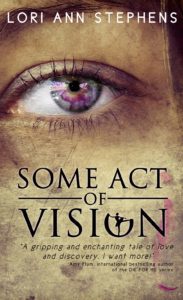 ing, September 2013), SONG OF THE ORANGE MOONS (Blooming Tree Press, Nov 2010), and several short stories and poems. SOME ACT OF VISION is the 2013 YA novel winner of the National Readers’ Choice Award, hosted by the Romance Writers of America, OK. After winning the English National Opera Minioperas libretto contest in 2012, she found herself writing lyrics to operas…that have real composers and singers and stages in London and the U.S.! When she’s not writing or teaching writing, she reads, takes on DIY home remodeling adventures, and eats the best gourmet, home-cooked meals. She is usually not the cook. She lives in Texas with her family.
ing, September 2013), SONG OF THE ORANGE MOONS (Blooming Tree Press, Nov 2010), and several short stories and poems. SOME ACT OF VISION is the 2013 YA novel winner of the National Readers’ Choice Award, hosted by the Romance Writers of America, OK. After winning the English National Opera Minioperas libretto contest in 2012, she found herself writing lyrics to operas…that have real composers and singers and stages in London and the U.S.! When she’s not writing or teaching writing, she reads, takes on DIY home remodeling adventures, and eats the best gourmet, home-cooked meals. She is usually not the cook. She lives in Texas with her family.
You can find Lori on Facebook, Twitter (@loriannstephens), Instagram (@jolietexas), Goodreads, Amazon, and on her website at www.loriannstephens.com.
About the Book
After ten years of ballet lessons, Jordan Walker has finally landed her first principal role in Romeo and Juliet. Sweeter yet, “Romeo” has asked her to the May Fling Ball at Winston High. But a massive Texas earthquake triggered by the fracking activity nearby tears apart the community and Jordan’s future as a dancer. The Walker family survives the earthquake, but now Jordan and her family are forced to abandon their old lives and flee to Galveston. It isn’t until she meets Caleb, a blind musician, that Jordan dares to hope again. And the more their secret friendship develops, the more Jordan understands the danger she’s placed everyone in.
September 29, 2017
Author Interview: Matthew V. Brockmeyer on Kind Nepenthe
Hello everyone! And welcome to another all-new author interview. Today I am speaking with another author from the Indie Eden Book Club, Matthew V. Brockmeyer about his horror novel, Kind Nepenthe. The book is about several different people who are all trying their best to do the right things in life, but are going about it in a way that can only spell disaster for them and the people they love.
Let’s see what Matthew has to say about his book, and if he has any tips for us on the writing process!
Welcome, Matthew! First things first: What is the one question that you wish people would ask you about Kind Nepenthe? (And what is the answer?)
What are the literary influences in the novel?
On the surface, as many readers have noted, it has similarities to Stephen King’s The Shining. I even put a couple direct references to The Shining in the novel, a little wink-wink to King fans. But I really see it as echoing the themes of Steinbeck’s Of Mice and Men. Misfit outcasts in search of better life, where they can live off the land and be one with nature, and the obstacles they face in that search and the tragedy that ensues. Steinbeck’s use of nature as metaphor is also a huge influence on me. The narrative structure of the novel was definitely influenced by Hubert Selby Jr.’s Requiem for a Dream. A montage of different characters whose stories intertwine, each seeking to fulfill a desperate dream but making terrible decisions that ultimately spell their doom.
That was really a great answer, I should have asked you that question! Which typical author interview question do you hate the most?
There’s no such thing as a bad question!
Good, then I don’t have to worry! You told us a bit about Kind Nepenthe in your first answer, but can you give us a short description of the book?
Kind Nepenthe is a story of bad choices made for the right reasons. Rebecca wants an organic farm where she can teach her daughter how to commune with nature and live off the land. Diesel Dan wants to be the father to his coming grandson that he never was to his own son. These are noble pursuits, but the characters pursue them down roads that can lead only to darkness. It is also the story of how the ghosts of the past can haunt and influence us, pulling us into their spell. The ghosts in this novel are really meant to serve as metaphors for the history of the land, from idealistic hippies who, in their pursuit of enlightenment and self-fulfillment, lost touch with their parental instincts, to the violent, outlaw nature of the Wild West.
I’m reading the book now, and what I like about it is that the characters are so human, and that the land seems to be a character in its own right. There is definitely a lot to discover and learn from this book!
On that same topic, your book is in the thriller/horror genre. What drew you to this genre? Do you also like to read books in this genre?
Horror is the ultimate genre for me. There is that rollercoaster thrill-ride aspect that I enjoy very much, but deeper than that there is an examination of who we are and what it means to be human. To exist on this mortal plane. In many ways our fears define us. I have a very broad definition of what horror is, and include a great many books within that umbrella that others would not consider horror. To me, The Lord of the Flies is a horror novel, as is Charles Frazier’s Cold Mountain, Cormac McCarthy’s Blood Meridian, Bret Easton Ellis’s American Psycho. So, yes, I read within the horror genre, but I include many literary works under that banner that others may not.
Is there any famous author that inspires you, or that you admire?
Oh, geeze. So many. It would be difficult to name just one. I guess I’ll go with Cormac McCarthy because I admire how bold and unafraid he is. Not afraid to have unlikable characters, not afraid to explore the darkest and most sinister elements of humanity, to go places other writers would be terrified to tread. Even his style, unabashedly original, shows no fear. His lack of punctuation, strange word choices, lapses into poetic and rambling descriptions. I’d never dream of trying to imitate him. A true one and only. And so very, very American. Exploring the western landscape with an unblinking eye. Arguably the greatest living writer today.
Wow, I can really see why you admire him! On the opposite side of the spectrum, thinking about the people who read your work instead now, who is your target audience for this book? What do you think will appeal to them about Kind Nepenthe?
My target audience is anyone who enjoys a thrilling and page-turning horror novel. That being said, it’s not for anyone looking for a feel-good book with happy endings. It’s very dark. I eschew the black-and-white, good-versus-evil aspects of some horror and dark fantasy, for characters who lurk in realms of gray. Oftentimes, as a writer, my goal is to make the reader care for and even root for the perceived villain, while giving the protagonist questionable attributes. I try to add a layer of depth in this manner. I like to consider my work literary-horror, all of the characters are flawed, vulnerable and wounded in one way or another. So, I guess I’m also targeting intelligent readers well-versed in literature. I’d like to think so at least, lol.
I think the book will certainly appeal to that audience! So, when you write a book, do you plan out everything beforehand, or do you let the story follow its own course?
I am definitely a plotter not a pantser. I generally have a beginning, middle and end all worked out before I start. If not formally outlined, at least in my head. But, sometimes my characters will surprise me and act out in strange ways that change the plot. I like everything to form organically, so if the story takes a turn I didn’t see coming, I will go with it, though I generally try to steer it back in the original direction.
Do you have any quirky writing habits?
Yes. I always write in the nude with aluminum foil wrapped around my head so no one can steal my ideas. Ha ha, just joking. Nothing too quirky. Just standard writer’s fare, note cards and outlines tacked up everywhere, stacks of scribble-filled notebooks.
Haha! Now everyone will be wrapping foil around their heads! :P Aside from that, do you have any writing tips for other writers?
Read, read, read. Underline, highlight, take notes. Reread what you like and reread it again. It all comes down to a love of reading and story, doesn’t it?
Well said! Keeping on the advice tack, what would you say is the best way to market your book? With which method have you had the most success so far?
Still figuring this one out! I’ve written a lot of short stories and developed a small fan base that way. I suppose everything is about social media these days. Find and know your community. Become a good member. For me this would be the horror community, who really are a very warm and friendly lot whom I very much enjoy talking and interacting with.
How did your book come to be published? What was your journey to publication like? Did you get a lot of rejection letters before you finally saw your name in print?
Lots of rejection letters, yes. I queried agents for six months. Got a few nibbles but no one ready to fully commit. Then I hit the indie publishers. Black Rose offered me a contract and I took it.
Is being a published author everything you dreamed it would be? If not, how is it different? Is there anything you would change about it?
Well, I of course always dreamed of being published by one of the big five publishers and being flown to book-signing tours and seeing my work in all the major bookstores, reviewed by The New York Times, interviewed on NPR. Obviously that doesn’t happen when you are published by an indie publisher. But it’s been fun!
I think all of us fellow indie authors know exactly how you feel. Thanks for sharing some of your knowledge with us, and I’m sure everyone will be checking out your book!
About the Author
Matthew Brockmeyer lives deep in the forest of Northern California with his wife and two children. His work has been featured in numerous publications, both in print and online, including, among others, Infernal Ink Magazine, Not One of Us, Body Parts Magazine, Timeless Tales Magazine, Pulp Metal Magazine, Alephi, Cultured Vultures, and the anthologies The Edge: Infinite Darkness, After the Happily Ever After, and One Hundred Voices.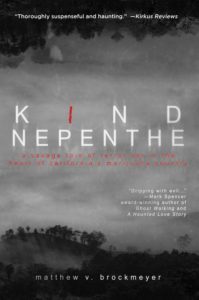
You can find Matthew on Facebook, Goodreads, and Amazon, and on his website at www.matthewbrockmeyer.com
About the Book
Rebecca thought she’d find a hippie paradise when she moved to the desolate back hills of Humboldt County. A place to commune with nature and teach her five-year-old daughter how to live off the land. Instead she discovered a nightmare.
Coyote is a washed-up pot grower. Strung out on pills and dealing with dropping prices and looming legalization, he wonders if it’s even worth it anymore.
Diesel Dan abandoned his son for a life of methamphetamine and prison. Now he wants to make amends. He’s going to be a grandfather. But his son is on the same dark road of drugs and violence that once consumed him.
These characters will come together in an explosive ending that will leave you stunned and breathless. But more than just a gripping horror novel, Kind Nepenthe is a deep examination into the nature of love and greed, lost ideals, and the essence of evil in one of the last frontiers of the American West.
September 15, 2017
Author Interview: E. Rachael Hardcastle on Finding Pandora
Hi everyone! Welcome back to my author interview series. Today I’m sitting down with E. Rachael Hardcastle, member of the Indie Eden Book Club and bestselling author of the Finding Pandora series. Her YA high fantasy novels are about a young woman who must learn to believe in herself and her gifts as much as her supernatural friends do in order to save her planet. Let’s see what the author has to say about her books and about her writing process!
Hi Rachael! Let’s start by finding out which question I should avoid during this interview. Which typical author interview question do you hate the most?
“Where do you get your ideas?” It’s a fine question, but most authors (including myself) don’t know how to answer it. Ideas do sometimes just come to me – a sight, a sound or something in the media is all it takes. It always sounds like I either can’t be bothered or I don’t want to answer when I tell people ‘they just come to me’ when it’s not the case – they honestly do!
I can totally relate to that! Ideas just happen, you can’t always easily explain where they came from. So, building on those ideas, can you give us a short description of your book or books?
Finding Pandora: The Complete Collection combines all four of my gripping high fantasy books into one action-packed volume.
World (Book One) – Arriette Monroe never expected to be thrust into the heart of supernatural chaos, nor did she deem herself worthy of four very special gifts. But now she’s got friends to rescue, Vampyrs to fight and impossible expectations to meet. Although Arriette thinks she’s walking pandemonium, The Recruit think she’s their saviour. And they’re willing to prove it…
Heaven (Book Two) – Arriette Monroe is confident she can succeed as the Recruit’s newest leader, despite the trouble she’s caused and the innocents she’s killed. Having mastered the basics of her gifts, Arriette is prepared to tell her mother that she’s been chosen as Haeylo’s saviour, until an unexpected visitor creates chaos. Thrust into action once again, Arriette must determine if recent events, revealed secrets and the rumours of an opened box are interlinked, because if they are, she’s going to need a lot more than luck to save her friends this time…
Book Three (Infinity) – Haeylo’s thriving supernatural community comes under threat from a trusted, high- ranking Everlast, and after targeting Arriette’s newest sanctuary, she knows it’s time the Recruit challenged his actions. Stripped of her new powers and burdened with the arrival of another unique Vampyr, Arriette must find a way to protect her vulnerable community, and to prepare for the largest battle Haeylo has ever seen.
Book Four (Eternity) – Arriette Monroe has finally located Pandora’s Box but it’s guarded by a ferocious fire-breathing dragon. Using magic, the Recruit think they can bring it safely to their sanctuary, but greedy Everlast Falkon Lou has other plans for such power. Eager to gain control of Haeylo’s HPS, Falkon sends his army of Orcs and Werewolves to storm the Recruit’s lair and kill any Supe who stands in their way. Fortunately for Haeylo, that Supe is Arriette Monroe, and this time she won’t go down without a fight…
Those sound really exciting! Your books are in the genre of young adult high fantasy. What drew you to this genre? Do you also like to read books in this genre?
I’ve read books such as Divergent and Hunger Games and I loved them, so I guess you could say they inspired me to write YA. But Finding Pandora dates back to 2010 – it’s an old series I’ve re-written and re-released to suit the audience better. The book I’m writing for release in December 2017 is targeted at adults.
I’m looking forward to finding out more about that book too. In the meantime, is there any famous author that inspires you, or that you admire?
Mitch Albom – his work is fascinating and beautiful. If I’m ever 10% of the writer he is, I’ll count myself lucky.
When you write a book, do you plan out everything beforehand, or do you let the story follow its own course?
I use what I call ‘story beats’. These are notes I write alongside the first draft, kind of like my book Bible that I can use to reference the timeline, the descriptions of the characters, a break down of what happens etc. I do this as I go, then update it with every edit and re-write. It helps me keep track of things like a road map. I don’t plan in detail beforehand but I do plenty of research.
That’s a great idea. I need to do that too – you sound a lot more organized than I am! Aside from that, do you have any writing tips for other writers?
Be brave. If what you’re writing makes you cringe and worry what other people think, you’re probably on the right track. Don’t let that stop you. Write it down, edit it later. Be bold with your writing – you need to stand out from the rest of us.
Great advice. :) What would you say is the best way to market your book? With which method have you had the most success so far?
I actually put an Introduction to Marketing Webinar together to help indies follow in my footsteps. I’m nowhere near where I want to be, but the past 18 months have been fantastic and I wanted to share how I managed it. I was on TV, have had several radio interviews, became a bestseller and I have now got my book into two independent bookshops. I sat and listed the top 10 things I did to get there, then developed a one hour webinar to teach others. The techniques are tried, tested and in some cases even evidenced. I hope it will help other indies like me.
Wow that’s so great, you’re living the dream! So, how did your book originally come to be published? What was your journey to publication like? Did you get a lot of rejection letters before you finally saw your name in print?
I had an agent and even had an offer from a small publishing house when I first started out, but it wasn’t for me. I wanted to give it a go on my own, learn the ins and outs of the publishing world and prove my worth first. I’m enjoying being indie but would love to be hybrid one day too.
That’s really admirable. Thanks for sitting down for this interview, and for sharing some of your secrets to success with us!
About the Author:
E. Rachael Hardcastle is a high fantasy and post-apocalyptic author from Bradford, West Yorkshire in the UK.
Rachael has been learning her craft since early 2010 and first published at the age of 14 having written an 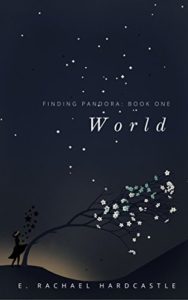 inspirational poem in school. Her debut novel, The Soul Sanctuary, was published at just 18 years old while still studying her A-Levels.
inspirational poem in school. Her debut novel, The Soul Sanctuary, was published at just 18 years old while still studying her A-Levels.
Rachael has taken courses about writing for children and young adults, and she is now studying to copy-edit for publishers across the UK. She supports local businesses, visit schools and promotes independent publishing, so all her stories are written, edited, formatted and published without external help, offering a low-cost, epic adventure and a memorable escape from reality for her readers.
Rachael believes that through writing we face our darkest fears, explore infinite new worlds and realise our true purpose. She writes to entertain and share important morals and values with the world, but above all, she writes to be a significant part of something incredible.
To find out more about Rachael, you can visit her website at www.erachaelhardcastle.com or find her on Facebook, Twitter, and Instagram.
About the Book:
Arriette Monroe never expected to be thrust into the heart of supernatural chaos, nor did she deem herself worthy of four very special gifts. But now she’s got friends to rescue, Vampyrs to fight and impossible expectations to meet. Although Arriette thinks she’s walking pandemonium, The Recruit think she’s their saviour. And they’re willing to prove it…
You can find this book and the others in the series at www.erachaelhardcastle.com/books.
Be sure to come back to jessicascottauthor.com next Friday for a special feature on how to publish on Smashwords!
August 25, 2017
Author Interview: Briseis S. Lily on Of Hustle and Heart
Hello everyone! And welcome back to my author interview series.
Today, I am interviewing Briseis S. Lily, member of Indie Eden Book Club and author of Of Hustle and Heart. Her novel tells the story of a girl named Zina who has to find a way to cope with, not just the normal emotional struggles that come with being a teenager, but also a lot of other financial and personal struggles she is too young to face. Let’s see what Briseis has to say about her book, and about her writing process.
Hi Briseis! Let’s start by finding out which question I might have left out. What is the one question that you wish people would ask you about your latest book? (And what is the answer?)
I think I’m open to most questions that anyone would ask, I’m curious to see and hear what people think about the stories I’m choosing to tell. For my latest book, Of Hustle and Heart—and the series as a whole, it’d be cool if people asked me about how relevant I think Zina’s story is and how it translates in terms of what young women go through in society. These books are written with the experiences and ideas of modern young women in mind and I’d like people to inquire about the vulnerability that Zina is forced to experience and in the ways she comes to terms with how it changes her.
I guess the question would be, “Do I think a massive amount of young girls and women are forced to experience life in a way they are not prepared for?”
To that, my answer is yes. This isn’t a new concept or occurrence and I thought that the conversation needed a refresher, women and young girls need to have this conversation about strength and vulnerability. I think you find one in the other. And truthfully, I’ve not seen a lot of stories like this written about people of color, in a real-world setting, that’s bothersome for me and I know I’m not alone. I wanted to explore it.
Also, I found it was someone’s opinion that they’d wished Zina’s [the lead character’s] strength would’ve held up longer in the story. I think back to 2014, when I first started writing for Zina—I felt then that there were a lot of women and young adult girls who might believe being vulnerable is a weakness. I use to believe this when I was younger, but it’s B.S.
You experience life and people in such a profound, deepening way in times of vulnerability —and it becomes life altering. Vulnerability is strength. Of Hustle and Heart is about drawing strength and creating yourself in times of effed-upness.
That’s a great way to think about it, and a very inspiring answer! Can you give us a short description of your book?
Of Hustle and Heart is about the emotional and financial struggles of a seventeen year old girl and how she copes and manages what her life is and what she wants it to be. It’s the first book in a series featuring the characters Zina Cochrane and Zacarias Moreno. Eventually she meets Zack, they become sort of friends- in passing as they lead separate lives from one another.
Your book is in the young adult/contemporary fiction genre. What drew you to this genre? Do you also like to read books in this genre?
I read Y.A and I mostly read contemporary work. Adult and Y.A. contemporary mostly. Really, I just like a good story. I can’t really remember how I started in this genre. I know I was working on a short-story for a short story competition for writer’s digest magazine. I chose the young adult- romance category, because I’d never tried or considered writing young-adult, I always wrote adult fiction. There were a lot of things happening that fueled my decision to write in this genre. I wanted to write a book that young adults could relate to and that young adults who are P.O.C. (people of color) could see themselves in.
I have been reading the book this week myself, and I can definitely say that it is relatable! Who is your target audience for this book? What do you think will appeal to them about Of Hustle and Heart?
You know, honestly, if you can’t relate to Zina and what she’s going through internally and economically, then you’re probably not my target audience. It seems like stories like Of Hustle and Heart are hard to find. The #ownvoices movement and the ‘We Need Diverse Books’ organization speaks a lot to this. When I wrote Of Hustle and Heart I had no idea any of those two things existed. I was completely unaware of it. I found them after I was published and trying to find the audience. I think my target audience is women ages 13- whatever.
There are women who might’ve been where Zina is in some way. Her particular lived experience might not be yours or mine, but we’ve all been young, confused, hurt, stressed—emotions on full-throttle, to me that’s a universal occurrence. I relate to her because she’s trying, despite the things happening to her and the people she loves, she’s struggling to maintain her independence. She’s 17, she doesn’t know what to do most of the time, but doing nothing isn’t an option for her. I think Zina’s vigilance in the way she approaches everything is super relatable. She’s a survivor.
I love books with strong female characters like that! Moving on to your writing process now, when you write a book, do you plan out everything beforehand, or do you let the story follow its own course?
I don’t really plan, not like, really. I do character development, I write some scenes and I focus on the relationships, developing those, before I start the manuscript. I focus on plotting after I feel good about the characters and the relationships they will develop. I do a lot of character development.
That’s a great idea. I always say that the characters are the most important part of the story, so I like that you make sure you know them really well before you get into the story itself.
Do you have any quirky writing habits?
I keep a small mirror on my desk so when I look up from my computer or notes I see, well—me. Seeing my face keeps my rooted and reminds me of what I believe in and what I’m about. Seeing my reflection, keeps me focused. It’s weird, but in a cool way, maybe?
That actually makes a lot of sense! I never would have thought of that. :) Do you have any writing tips for other writers?
Read a lot and read everything, that’s how I learned.
Write what’s important to you. Write to heal something or someone. And write a lot.
What would you say is the best way to market your book? With which method have you had the most success so far?
Heck if I know. I went to school for marketing but it seems a bit different when you’re marketing something you’re so attached to, something you created. Pretty sure there was a lot of bias, and clouded judgment going on in the beginning. I’ve grown and learned to separate my work from marketing efforts. You definitely can’t take failures personal. Its two different worlds, the business apart from the craft. When you’re the creative and the business it’s a weird thing to sort through. I had a difficult time with it at first I was too emotional about it.
Eventually you gotta separate the business from the creative but you can’t let the business get in front of the creative. As far as marketing goes, essentially the most important thing is getting your work in front of as many readers as possible, this is the goal and the challenge. Get on social media, engage, reach out, build a community, run promos, host giveaways, the list goes on and on.
That’s some really good advice. So, how did your book come to be published? What was your journey to publication like? Did you get a lot of rejection letters before you finally saw your name in print?
My publisher is called Nolavee Bookgroup Publishing, I started it when I published Of Hustle and Heart. You can follow our Instagram and Facebook page. We’d love to have you join the community.
So, I went back and forth for a while trying to decide how I’d pursue publication. Indie or self-publishing was not something I wanted to pursue originally. I didn’t know much about it, but it felt like cheating—go traditional was always my belief. My sister pushed me to try it. I mean, she really would come and tell me about all of the authors she’d find through kindle who were self-publishing their work, she was a big believer in it, even though I was side-eyeing her every time she came with that. Eventually I told her I’d look into it. I like challenges, I kinda go the hard way, for some reason, and when I found out through research how challenging self-publishing really was, it excited me. I wanted to step up and see if I could get my book professionally done, and marketed on my own. Plus the industry has a history of not really offering books written by and featuring persons of color in mainstream stories, at least it doesn’t seem like it. So I decided I’d write as much as I want and publish my books under my own publishing company. It’s been really cool. It’s fun and hard as hell sometimes. I do everything 100 percent on my own—funding, writing, marketing, building, whatever needs to be done I do it. It’s satisfying when I think of all the stuff I’ve done. But I have a long way to go. Lots of books to write and stories to tell.
That’s great, you have a really inspiring story! Thank you for sitting down to do this interview with me, and I wish you the best of luck with your books!
About the Author:
Author Briseis S. Lily is a marketing and communications student, turned author living outside the Houston area. She is currently working on the second book in the ‘Of Heart’ series titled ‘Absolution of the Heart’ and publishing her first adult- contemporary novel, both releasing in 2018.
Connect with Briseis on:
Goodreads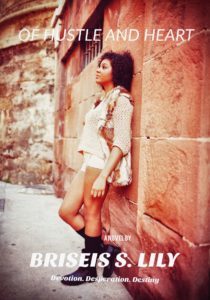
Amazon
Instagram
Twitter
Facebook
Find out more at briseislily.com.
About the Book:
When twenty-four-year-old Zacarias Moreno catches himself staring at the pensive hazel-skinned girl in the stairwell, he knows it’s inappropriate, yet he can’t help himself. But he’s not the only one looking.
Zina Cochrane’s life is about to get very complicated.
As her senior year at Albert Chesney High School in Houston, Texas, nears its end, Zina is ready to balance her schoolwork and social life with her attempts to hustle up some much-needed cash.
What she doesn’t count on, though, is the danger she’s about to find herself in—or the pain of the heart’s struggle to find true romance.
Of Hustle and Heart is available on Kindle, ITunes, BN and Kobo.
August 11, 2017
Author Interview: Joshua Harding on Red Lakes
Happy Friday, everyone!
The next interview in my author interview series is with Joshua Harding, a member of my Indie Eden Book Club on Facebook and author of Red Lakes. Red Lakes is a biopunk dystopia novel (read on to find out more about that genre) that takes place in a world in which meat is artificially made and grown in labs, and a clone of a man who looks a lot like a certain beloved fast food clown is the leader of Soviet Russia. The main character, another clone, is thrust into a position of power, but then must decide how best to use it.
Let’s find out more about Joshua Harding, and about this surprisingly timely novel!
Hi Joshua! First things first: What is the one question that you wish people would ask you about your latest book?
Whether I want fries with that…(kidding). Every day it seems like my latest book, Red Lakes, which is a dystopia, should be required reading under our current president. I wish more people asked about the political commentary of my novel, both what originally influenced it and how it can be viewed in context with current events. Red Lakes is about a fast food totalitarian regime, ruled over by the clone of a clown. I wrote it years before the 2016 election, but it seems to have been chillingly prescient.
If only everyone would have read your book sooner! On the flip side, which typical author interview question do you hate the most?
Not so much in interviews, but a question invariably comes up if I’m introduced to someone as an author. They ask what publishing company I went through, with the added question: “You’re not one of those self-published authors, are you?” (Always with a sneer, too.) I think there will be a disdain for self-publishing for some time to come. Sort of like the way the aristocracy of a century ago looked down their noses at the Nouveau Riche—they weren’t really “part of the club.” The stigma against self-published authors certainly has come a long way over the past decade, but it may be a while before a writer who pounded out his own manuscript with no advancement or deadline, ponied up cash for an editor and cover artist, formatted, promoted, and hustled his work all by himself is held in the same regard as a writer who happened to catch a slush pile reader’s eye.
That is a refreshingly honest way of putting it, and something I can definitely relate to as a self-published author myself. A lot of people don’t realize just how much hard work and effort goes into self-publishing a book!
Transitioning to your work now, can you give us a short description of your book or books?
My debut novel, Red Lakes, is a biopunk dystopia set in a fictional Soviet Russia. Biopunk is a subgenre of Science Fiction that explores the consequences of biotechnology, in this case, human cloning. Following a nuclear holocaust, a new Soviet totalitarian state rises out of the ashes and bears a chilling resemblance to a major fast food chain. Everyone eats burgers and the savior of the state-approved religion has red hair, white skin, and enormous feet. Sergei, a meat farmer in the Ukraine, learns that he is actually a clone of the State’s founder and destined to become its Premier. The secret police whisk him away to Moscow where he is prepared for absolute power. Sergei is then kidnapped by a group of terrorists who are bent on overthrowing the State. They open Sergei’s eyes to the atrocities meted out by the State on its people: torture, human cloning, and dietary oppression. Sergei escapes his captors and returns to Moscow but to what end? Does he assume the Premiership or follow the terrorists in their desperate struggle?
My next novel, Catch-23, will be a semiautobiographical account of my time working with nuclear missiles in the Air Force.
I hope you come back for another interview about Catch-23; I have a lot of questions after reading that you worked with nuclear missiles!
Your book is in the science fiction genre. What drew you to this genre? Do you also like to read books in this genre?
I have to say, seeing Star Wars in the theater in 1977 was what started it for me. Then all the other Lucas, Spielberg, and Henson masterpieces that came out soon afterwards solidified my love of all things geeky and Sci-Fi. Man, what an awesome time to be a kid! I think that’s why people say my stories read like movies or could be adapted into movies. I read a ton of Sci-Fi. I cut my teeth on the works of Frank Herbert, Kurt Vonnegut, and Ray Bradbury. Lately I’m into my contemporaries like my good friend Ian Tregillis, biopunk author Paolo Bacigalupi, and self-published sensation Hugh Howey.
Is there any famous author in particular that inspires you, or that you admire?
T. C. Boyle is probably the author who has most influenced my work. He is a master of the short story and has a mercilessly satirical style. His stories are usually surreal and contain a sharp social commentary. My favorite first line of his goes, “I was living with a woman who suddenly began to stink.” I remember crashing on a friend’s couch in New York City and finding a copy of his short story collection, The Descent of Man. I was blown away. I thought, Wow! This guy writes the way I think!
Who is your target audience for this book? What do you think will appeal to them about Red Lakes?
My Ideal Readers are politically savvy fans of sci-fi and socially conscious nerds: readers who enjoy a good yarn and a topic that challenges conventions and sparks controversy. Red Lakes lampoons the obesity epidemic, the war on terror, and the political hijacking of 9/11. But it will also appeal to fans of political satire. Fans of The Daily Show and Jello Biafra will enjoy its tongue-in-cheek humor against a frighteningly possible backdrop.
I’m reading Red Lakes now, and I can see how it would appeal to all of those groups. I don’t know whether to laugh or be afraid while I’m reading it, haha!
So when you write a book, do you plan out everything beforehand, or do you let the story follow its own course?
I’ve had a lot of success outlining everything before I start. Those outlines have taken several forms from Excel spreadsheets to Post-It notes stuck to a bulletin board to a hand-drawn timeline. It helps parse up the enormous task of writing a novel into smaller pieces (…the best way to eat an elephant is one bite at a time…). It’s also invaluable for ensuring the story arc hits all of the important plot points (Introduction, Narrative Hook, Rising Action, Climax, Falling Action, and Resolution). That’s not to say that once I’m elbows-deep in the writing that I won’t change aspects of the outline because the story has taken a new and unforeseen direction.
That sounds like a great method! In that same vein, do you have any quirky writing habits?
I like to wear my fez while I write (much to my wife’s chagrin). I also make music playlists that fit the theme of what I’m writing. It really needs to be instrumentals or in a foreign language I can’t understand so the lyrics don’t intrude on the writing. So, if I’m writing some kind of noir piece, I’ll put on Miles Davis or Dave Brubeck. If it’s a period piece, I’ll listen to Mozart or Vivaldi. A creepy Sci-Fi, I’ll play Autechre or Aphex Twin. I listened to a whole bunch of old Soviet propaganda music while writing Red Lakes.
Do you have any writing tips for other writers? (Other than wearing a fez while they write?)
I’m asked this a lot and my answer is a bit cliché, but setting aside at least an hour every day to write is essential. The simple act of putting one letter in front of another on a consistent basis improves your writing, gets the creative juices flowing, and makes blank pages seem less daunting. I can’t say that I’m always consistent in that routine myself, but I can say it works. Read everything you can get your hands on. And, most importantly in today’s social media environment, seek out your fellow writers. Network with them, critique each other’s work, and celebrate each other’s successes. We’re in this together, not as competitors.
That is great advice. :) Maybe you have some more on marketing. What would you say is the best way to market your book? With which method have you had the most success so far?
There certainly isn’t one “best” way to market a book. So many factors come into play, whether it’s your book’s target audience and premise or your abilities with marketing and social media. Sci-Fi authors’ target audience includes a lot of people who regularly use social media; cozy, Regency-period mystery authors—maybe not so much. Adapting your marketing to your book and your readers is your best bet. Some people swear by doing in-person signings at fairs and conventions, others with speaking engagements. I’ve had the most success with promotion campaigns on Facebook, Twitter, and Instagram like BookFunnel or a Multi-Author Spec-Fic Promotion.
How did your book come to be published? What was your journey to publication like? Did you get a lot of rejection letters before you finally saw your name in print?
I did–and still do–get quite a few rejection letters. I even used to pin them (when they were still sent out through the mail) to the wall above my desk as a macabre sort of motivation. I came to the realization one day that the premise of Red Lakes and the fact that it lampoons a major fast food chain (with a track record of libel suits) might make some publishers think twice about taking on a new, unproven author. So, I decided that self-publishing was the best route to maintain my vision for my work and be beholden to no one but myself as a writer.
I think Stephen King used to that with his rejection letters too! Maybe it’s good luck. ;)
Now for my final question: Is being a published author everything you dreamed it would be? If not, how is it different? Is there anything you would change about it?
Few things in life fit the picture we have of them beforehand. Sure, I dreamt I’d get signed with one of the big publishing houses then roll naked in my money while writing my next bestseller. But now, looking back on my choice to self-publish, I wouldn’t change a thing. I probably won’t even bother to send my next manuscript to publishers. I think what’s really at the core of your question is what’s my definition of success. If I can get the crazy thoughts out of my head and in front of other people, then I’m a success.
That is a great way to put it. Good luck with your next books, and thank you for sharing your thoughts and advice with us!
About the Author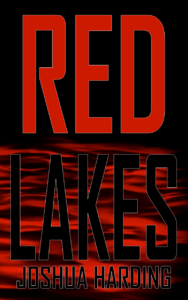
Joshua Harding is an award-winning novelist and short story author. He’s worked as a nuclear missile mechanic, an environmental lobbyist, a cemetery restorer, freelance artist, puppet master, set designer, actor, carpenter, mortuary officer, and garbage man. The only thing he’s done longer than any of them is write. His fiction is currently featured on Writer’s Digest, QuarterReads, and Acidic Fiction. He lives in a four-person artists’ colony in the woods north of Chicago.
You can find Joshua on Facebook, Twitter, Instagram, Amazon, and Goodreads, or you can visit his website at http://jharding71.wix.com/joshuajharding.
About the Book
No greatness was ever borne without pain… A nuclear holocaust has devastated humanity. Out of the ashes rises a new Soviet totalitarian state that bears a chilling resemblance to a major fast food chain. Everyone eats burgers and the savior of the state-approved religion has red hair, white skin, and enormous feet. Sergei, a meat farmer in the Ukraine, learns that he is actually a clone of the State’s founder and destined to become its Premier. The secret police whisk him away to Moscow where he is prepared for absolute power. Sergei is then kidnapped by a group of terrorists who are bent on overthrowing the State. They open Sergei’s eyes to the atrocities meted out by the State on its people: torture, human cloning, and dietary oppression. Sergei escapes his captors and returns to Moscow but to what end? Does he assume the Premiership or follow the terrorists in their desperate struggle?
July 28, 2017
Author Interview: C.A. King
Happy Friday, everyone!
Today I am chatting with author C.A. King, another member of the Indie Eden Book Club. Her short story, When Leaves Fall, is a heartbreaking tale with a twist ending that really makes you think (and cry!). Let’s see what she has to say about her story, and about writing.
Hi C.A.! First things first: What is the one question that you wish people would ask you about your latest book?
How can I change the outcome?
After reading the book, I can see why! On the other hand, which typical author interview question do you hate the most? (I won’t be offended if you choose one of mine. :P)
When did you first know you were a writer? I dislike that question. We are all writers at heart. Some of us pursue it a bit more than others, but everyone has written a story at some point in their life.
Well said. Can you give us a short description of When Leaves Fall?
Ralph wakes up to what others only experience in a nightmare. Chained to a shed, he has no idea where he is, or who his captor is. His memories are blurred at best. As the days press on, he finds himself experiencing a roller coaster of feelings. Hunger, thirst and pain become his only companions. Flashbacks of a happier time are all he has to keep him going. As his situation deteriorates, he finds himself doubting he ever had the very thing he wants most – a family.
When Leaves Fall is a dramatic thriller with a twist. Keep the tissue box close for the ending.
WARNING: May cause extreme sadness
I can attest to that! I definitely needed the tissues for that ending. Is there any famous author that inspires you, or that you admire?
I truly admire Indie authors. I don’t think readers are aware of what goes into creating a book, not to mention finding a way to market it.
Exactly! It isn’t so easy being an indie author. So, your book is in the Literary Fiction genre. What drew you to this genre? Do you also like to read books in this genre?
As a Fantasy author, When Leaves Fall is completely outside my comfort zone. My muse started talking and didn’t leave me alone until I wrote it down. The emotions that went into it is what makes it a special read.
I do read this genre but not as much as I should.
Who is your target audience for this book? What do you think will appeal to them about When Leaves Fall?
This is a hard question to answer. The story has a message I think people should hear and understand. From that point of view, everyone is the target audience. It’s emotional; it’s realistic; and it’s important. Having said that, it’s also very sad. Individual readers need to decide if they can handle a good cry. If they can’t, this tale probably isn’t for them.
When you write a book or a story, do you plan out everything beforehand, or do you let the story follow its own course?
All stories plan out in my head. It’s like watching a movie. Scenes play until I write them down. There is always something new waiting.
I like that idea! Do you have any quirky writing habits?
Quirky as in ‘not leaving the house until a book is finished’ sort of quirky? I might be guilty of that.
Haha, that’s dedication! Any writing tips for other writers?
Be prepared. It doesn’t stop after the first draft.
What would you say is the best way to market your book? With which method have you had the most success so far?
I do a lot of events, book shows and author signings. I’d say that is my strongest market. Online, I am only now beginning to make a name for myself.
You gave us some great advice, thanks for doing the interview!
If you’d like to find out more about C. A. King, you can visit her website at www.portalprophecies.com. You can also find her on Facebook, Twitter, Instagram, Amazon, and Goodreads.
About the Author:
C. A. King was born and raised in Halton County. She currently resides in Brantford Ontario, Canada with her two sons.
After the loss of her loving parents and husband, Ms. King was devastated. She decided to retire from the work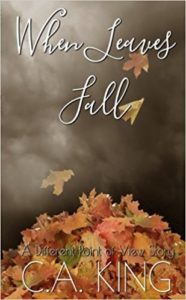 force for a year or two to do some soul searching. It was during this time that writing became her passion. She found she was able to redirect her emotions through her writing and in 2014 decided to publish some of her works.
force for a year or two to do some soul searching. It was during this time that writing became her passion. She found she was able to redirect her emotions through her writing and in 2014 decided to publish some of her works.
Today C.A. King has thirteen different titles available, with more scheduled for release. In her spare time she writes a weekly column, articles and book reviews for Books & Quills Magazine.
About the Book:
Ralph wakes up to what others only experience in a nightmare. Chained to a shed, he has no idea where he is, or who his captor is. His memories are blurred at best. As the days press on, he finds himself experiencing a roller coaster of feelings. Hunger, thirst and pain become his only companions. Flashbacks of a happier time are all he has to keep him going. As his situation deteriorates, he finds himself doubting he ever had the very thing he wants most – a family.
When Leaves Fall is a dramatic thriller with a twist. Keep the tissue box close for the ending.
You can find When Leaves Fall on Amazon.com.
July 12, 2017
Author Interview: E. Paige Burks on Return to Royalty
Hello everyone! And welcome back to my author interview series.
Today I am interviewing E. Paige Burks, another fellow member of my Indie Eden Book Club and the 2016 winner of the YA category of the Draft to Dream competition. Her fantasy novel, Return to Royalty, is our current Biweekly Read. It’s about a girl who has no idea that she is actually royalty from another world – until a dark, menacing (and broodingly handsome) stranger comes to take her back. Let’s find out more about Paige’s books and see if she has any tips on the writing process!
Let’s start by finding out which question I left out of my list. What is the one question that you wish people would ask you about your latest book? (And what is the answer?)
Hmm…This is tough for me. I think the one that I dislike the most that people ask is “did you really write this?” Um, yeah, I did, haha. I know a lot of people don’t know how we have time to write, but if it’s your passion, you make time for it. So maybe what I wish people would ask is “what’s your advice on writing a book?” My answer would be make time (just 30 minutes a day is all it takes!), set a goal (do it the NANOWRIMO way, you can write 50,000 words in just one month!), and overall be consistent! It’s not that hard, and don’t worry if it’s poo the first time around. First drafts rarely ever become the finished product. Just tell your story.
That is really great advice. I often find that finding time to write is one of the biggest challenges to writing a book too, but it is important to make time, like you said. Aside from people asking if you really wrote your book (which just seems rude, by the way! :P), which typical author interview question do you hate the most?
I’m not sure there are any that I hate. I like to talk about my book 
June 30, 2017
Author Interview: Teri Polen on Sarah
Welcome back, everyone!
This week I’m interviewing Teri Polen, whose book, Sarah, is currently the Biweekly Read for the Indie Eden Book Club. The book is a Young Adult horror novel that features some frightening twists and turns when a teenaged boy comes in contact with a ghost who wants to get revenge on the people who killed her. Let’s see what Teri has to say about the book, and about her writing process.
Hey Teri! Let’s start off with the question you would most like to answer about your book. What is the one question that you wish people would ask you about Sarah? (And what is the answer?)
I’m not sure how you’d phrase the question – I realize horror isn’t everyone’s flavor preference, but Sarah is also filled with humor. The banter between Cain and his best friend, Finn, was one of my favorite parts about writing this book. I had an adult come up to me just this week and say she absolutely doesn’t read horror books, but read Sarah without knowing the genre (her sister loaned it to her and she didn’t look at the cover) and totally enjoyed it. Said she might look into other books in the same genre.
Wow, so you converted her! Nice job! On the flip side, which typical author interview question do you hate the most?
I wouldn’t say I hate this question, but when I’m asked who would play my characters in a movie, it’s hard for me to picture anyone in those roles. I’m a ‘know it when I see it’ kind of person – it needs to click for me.
That’s understandable. I can never really answer that question either, haha. Can you give us a short description of your book?
Seventeen-year-old horror fanboy Cain Shannon thought helping a ghost track down her killers would be the supernatural adventure of a lifetime. Now, he just hopes to stay alive long enough to protect his family and friends from her.
Is there any famous author that inspires you, or that you admire?
There are so many! In September, I’m going to my third writing retreat hosted by author C.J. Redwine. She’s a wealth of writing/publishing information and has a knack for asking the right questions to get you to see your WIP [work-in-progress] from different angles and make it better. Stephen King, Victoria Schwab, J.K. Rowling, and Maggie Stiefvater for their books and vivid imaginations – I’d love to spend a day inside their heads.
Great choices! :) Your own book is in the horror genre. What drew you to this genre? Do you also like to read books in this genre?
I’ve been a horror fan since I was around 6-years-old when my dad let me stay up to watch Chiller Theatre with him. Horror movies/books, haunted houses, ghost stories – all fascinating. My go-to genres for reading are horror, sci-fi, and fantasy, so when the ideas started coming for a book – those were my natural directions. Just the way my mind works.
Who is your target audience for this book? What do you think will appeal to them about Sarah?
Sarah is a YA book, so obviously teenagers are the target audience. That being said, YA books aren’t just for teenagers, and many adults have commented on how much they enjoyed reading it. I’ve had reviewers describe Sarah as “a twisted take on a classic plot” and “YA horror with a heart” that “maintains an offbeat sense of humor and unexpected morality”. Sarah isn’t ‘in-your-face’ horror, it also contains some humorous parts. I’ve had a couple of devout anti-horror friends read my book and they both enjoyed it – no nightmares.
Ah, so it is a book for everybody! To get into your writing process now, when you write a book, do you plan out everything beforehand, or do you let the story follow its own course?
My first book (that shall never see the light of day) had more of a ‘pantster’ type of development and was just all around cringe-worthy. With Sarah, I did a bit more outlining, but was still surprised at the directions the characters took the story sometimes. My current WIP has an outline, but I’ve also ventured from that road map. I get distracted by shiny things occasionally and have to force myself to focus on the endgame.
[For all the non-writing readers, a “pantster” is someone who “flies by the seat of their pants” and lets the story take them where it will, without planning it out first. ]
Do you have any quirky writing habits?
I don’t think so. A Diet Coke is generally involved, sometimes chocolate, usually music, and I change up where I write. Different views and surroundings inspire me.
You had me at chocolate! Any writing tips for other writers?
Study your craft, read in your genre, and just keep swimming. Don’t be that person who wonders what could have happened.
That’s great advice. Moving into marketing now, what would you say is the best way to market your book? With which method have you had the most success so far?
Sarah was on NetGalley for a few months and I was really pleased with the number of reviews that generated. My own blog has helped and several blogger friends/authors have been very generous in helping to promote Sarah. I’m just starting to attend book festivals and book signings – so I’ll have to get back to you on that.
How did your book come to be published? What was your journey to publication like? Did you get a lot of rejection letters before you finally saw your name in print?
Rejection letters? What are those? *snort* I don’t know of any writers who haven’t been rejected at some point – I went through years of querying and rewrites, but Black Rose Writing actually found me. Another publisher I’d queried required their submissions to be uploaded to Authors.me. I had the option to put Sarah into ‘discovery’, which enabled other publishers to read it, and after a few months, received an offer from Black Rose.
Oh, that’s interesting! I might have to check into Authors.me. Okay, now for the last and possibly most important question: Is being a published author everything you dreamed it would be? If not, how is it different? Is there anything you would change about it?
I was shocked upon realizing I wouldn’t be able to retire early and live off my royalties. *another snort* Wait – I need a tissue to wipe away the tears of laughter. It’s not just sitting down to write and improving your craft. Promotion takes a considerable amount of time – interviews, scheduling/attending signings, SWAG, giveaways, maintaining a social media presence. But I wouldn’t change a thing about it – I love every minute.
That’s great, and very inspirational! Thanks for the interview, Teri, we learned a lot!
About the Author:
Teri Polen reads and watches horror, sci-fi, and fantasy. The Walking Dead, Harry Potter, and anything Marvel-related are likely to cause fangirl delirium. She lives in Bowling Green, KY with her husband, sons, and black cat. Sarah, a YA horror/thriller, is her first novel. Visit her online at www.teripolen.com
You also can find her on Facebook, Twitter and Goodreads.
About the Book: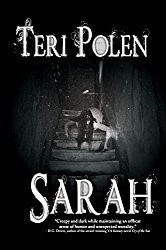
Seventeen-year-old horror fan Cain Shannon thought helping a ghost find her killers would be the supernatural adventure of a lifetime. Now, he just hopes to survive long enough to protect his family and friends from her.
A bet between friends goes horribly wrong, resulting in Sarah’s death. When she returns to seek justice against those responsible, Cain agrees to help her. But when he discovers Sarah has been hijacking his body, he realizes she wants retribution instead of justice.
Terrified of what could have happened when he wasn’t in control, Cain commands Sarah to leave his house – but exorcising her isn’t that easy. She retaliates against her murderers in bloody, horrific ways, each death making her stronger, then sets her sights on Cain. With the help of friends, Cain fights to save himself and his loved ones and searches for a way to stop Sarah before she kills again.
Sarah is on sale now from Amazon, Barnes and Noble, and Black Rose Writing.
June 16, 2017
Author Interview: Patricia Panahi discusses Veil of Walls
Hello everyone! And welcome back to my author interview series.
Today I am interviewing Patricia Panahi, another member of my Indie Eden Book Club, about her debut novel, Veil of Walls. It is the story of a young girl who goes to Iran with her family to visit her relatives, but ends up staying much longer than she wants to. Let’s see what Patricia has to say about it, and about her writing process.
Hi Patricia! Let’s start with one of my favorite questions: Which typical author interview question do you hate the most?
“Is this book autobiographical?” I lived in Iran during the time period, but if I wanted to write about my own life, I would have written a memoir. Aside from the initial culture shock, my own life wasn’t interesting enough for a memoir, so I wrote Veil of Walls as a complete work of fiction.
Can you give us a short description of your book?
[From back blurb] Anahita Sadeghi, a typical, happy-go-lucky American ten-year-old, was not too keen on traveling to the other side of the world to meet her father’s family. But her month-long vacation turns into a nightmare when her Persian relatives refuse to let her return to the States. She is forced to deal with the dizzying maze of social customs, resist her grandmother’s efforts to mold her into the proper Persian girl, dodge her aunt’s schemes of marriage, and fight to make her own life choices until she can find a way to return home. Longing for her friends and her freedom, only the enigma of her missing aunt, Scheherazade, gives Ana a glimmer of hope of one day escaping Iran for good. Will Ana’s family marry her off and forever bind her to this country, or will she break free of Iran’s walls and find her way back to America?
Is there any famous author that inspires you, or that you admire?
I love good writing and a story that sweeps you away. A few of my favorites are Ann Rice, Alice Hoffman, and Deborah Harkness, among others.
Good choices! Your book is in the literary fiction genre. What drew you to this genre? Do you also like to read books in this genre?
I categorize Veil of Walls as literary, historical, and cultural.
Literary, in my definition, is good writing and since I taught English in college, that is important to me.
Historical and cultural novels transport me to other times and/or other places, bringing history and cultures alive in my imagination.
So to answer your question, I do read regularly in this genre, but I also enjoy a well written book with a touch of magic or the supernatural like works from the authors I mentioned above.
Who is your target audience for this book? What do you think will appeal to them about Veil of Walls?
My target audience are educated females who enjoy reading and learning about other times and cultures, readers of The Kite Runner, The Pearl That Broke Its Shell, Memoirs of a Geisha, Septembers of Shiraz, etc.
When you write a book, do you plan out everything beforehand, or do you let the story follow its own course?
I did not plan out Veil of Walls, but I wish I had. It took me ten years and 33 drafts to finally land an agent and a publisher. I am outlining my next book, though.
Wow, that is a long time, and a lot of writing! Do you have any quirky writing habits that you used when writing this book or others?
Not really. I usually just write until my eyes are sore, then stop.
Any writing tips for other writers?
Success in a writing career requires tenacity and extreme patience and persistence. Never give up!
That’s the same advice I give! : ) What would you say is the best way to market your book? With which method have you had the most success so far?
I am still learning this, but I have done several author events. I have found that giving a presentation works best followed by a book signing. I have a website and I am very active on social media and a member of numerous writing and reading groups. My publisher has just placed my book on Kindle Unlimited for a period of time to get attention and more reviews. I am also listed on NetGalley to garner additional professional reviews.
How did your book come to be published? What was your journey to publication like? Did you get a lot of rejection letters before you finally saw your name in print?
Ten years and agent rejections beyond count. Revised again and again using paid editors, notes from agents, notes from publishers after landing an agent, and suggestions from my agent.
You really have gone on quite the journey with this book. Is being a published author everything you dreamed it would be? If not, how is it different? Is there anything you would change about it?
My novel was recently published so cannot say, but wish I didn’t have to do so much of the marketing. I would prefer to just write.
I totally agree (as people might know from my previous posts on the subject). Thank you for taking the time to do this interview, and for all the great writing tips!
You can find out more about Patricia Panahi below, and you can buy both the ebook and print versions of her book on Amazon.com.
About the Author: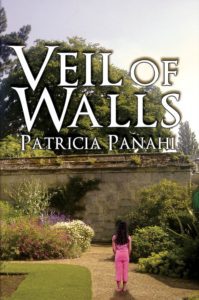
Patricia Panahi was born in Massachusetts from an American mother and Iranian father. At the age of nine, her parents divorced and she was taken to Iran where she lived for the next 16 years, muddling her way through the complexity of Persian culture. In her early twenties, she returned to the States and earned a BA in English and MA in Linguistics from San Diego State University, and, years later, a PhD in Holistic Nutrition from Clayton College of Natural Health for personal interest.
Panahi has taught English in Iran, California, and Hawaii, owned and operated The Light Spot Bookstore and Coffeehouse in San Diego, and directed English Language Programs for international students for the University of Hawaii. Her writing work includes The Well Woman Cookbook, God Outside the Box, and her debut novel, Veil of Walls. She lives on the beautiful island of Hawaii with her husband, Mark.
You can find her on Facebook and Amazon, and on her author website at www.patriciapanahiauthor.wordpress.com

